Hip surgery is a revolutionary procedure that alters life in several ways. People usually do it to relieve mobility issues, pain, or hip-repair injuries. Although it is an essential procedure for improving one’s life, post-operative care for hip surgery plays a great role in efficient recovery. It requires tremendous amounts of care and supervision. Nevertheless, one important but often overlooked aspect of post-operative care is wearing compression socks after hip surgery. We should consider them an essential asset for hip surgery recovery.
Compression socks are specialized garments or gear designed to provide graduated pressure to your legs while relieving pain and discomfort and helping to prevent conditions like deep vein thrombosis (DVT), varicose veins, pedal edema, and improper blood circulation.
In this article, we will explore the beneficial effects of compression socks after hip surgery and uncover all the details regarding why compression socks are necessary after hip replacement surgery. So stay with us till the end, and let’s dive into the debate!
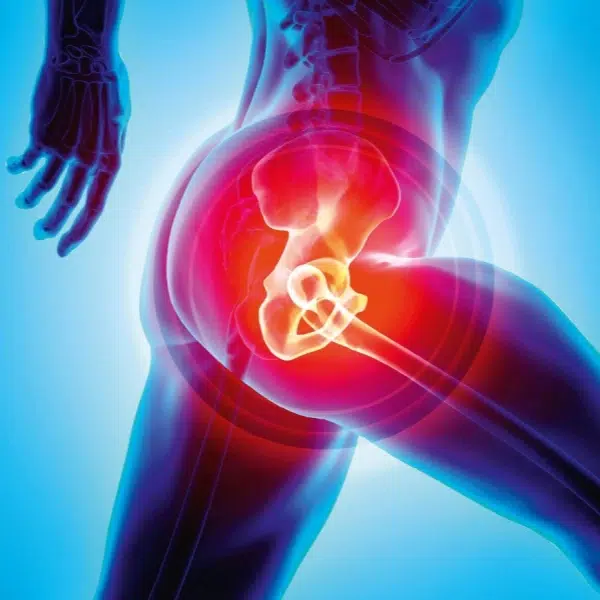
Source:https://christopherboonemd.com/blog/what-is-the-main-cause-of-needing-a-hip-replacement/
Understanding Wearing Compression Socks after Hip Replacement Surgery
Compression socks are specialized socks designed to provide comfort and graduated pressure to your legs. This graduated pressure helps maintain proper blood circulation throughout your legs, thus aiding the venous return to your heart.
Not only do they prevent several life-threatening conditions, like deep venous thrombosis, elephantiasis or filariasis, varicose veins, and blood circulation issues throughout your legs, but they also help maintain a healthy lifestyle. Besides, they are also advised for several post-surgical procedures, to enhance the recovery period by preventing unnecessary circulatory issues due to immobility. This is because compression socks can help reduce unnecessary swelling and improve blood circulation.
Wearing compression socks after hip surgery can be highly beneficial. Compression socks can aid in several aspects of recovery. Any surgery has several post-operative complications, including hip replacement surgeries.
Due to prolonged immobility as advised by the doctors after surgical procedures, it can lead to conditions like edema, lymphatic obstruction, DVT, or varicose veins. Compression socks help alleviate all these conditions by their specialized pressure-generating properties. But how does it happen? Let’s discover it in detail in the next section!

Source:https://www.floresvaldivia.com/blog/sleeping-positions-after-abdominal-surgery/
How do Compression Socks Help in Recovery after Hip Replacement Surgery?
If you are considering using compression socks for better circulation and preventing post-surgical complications after hip replacement surgery, then you are on the right track.
Compression socks serve as an asset to prevent post-surgical complications after any procedure. They do so by their exceptional pressure-generating properties, which are particularly designed to improve blood circulation within your legs.
The coming up next is how compression socks help in post-surgical successful recovery:
Prevention of Deep Venous Thrombosis
One of the most common complications that a patient faces after hip replacement surgery is the occurrence of deep venous thrombosis. DVT is a condition characterized by the development of blood clots within the veins, which most commonly occurs due to prolonged immobility after any surgery.
Compression socks can help to prevent post-surgical DVTs by exerting gentle pressure on the lower extremities, which will help to enhance blood circulation, preventing blood stasis within the legs, thus simultaneously reducing the risks of development of blood clots.
In this way, compression socks can help reduce the chances of DVT after hip replacement surgery.
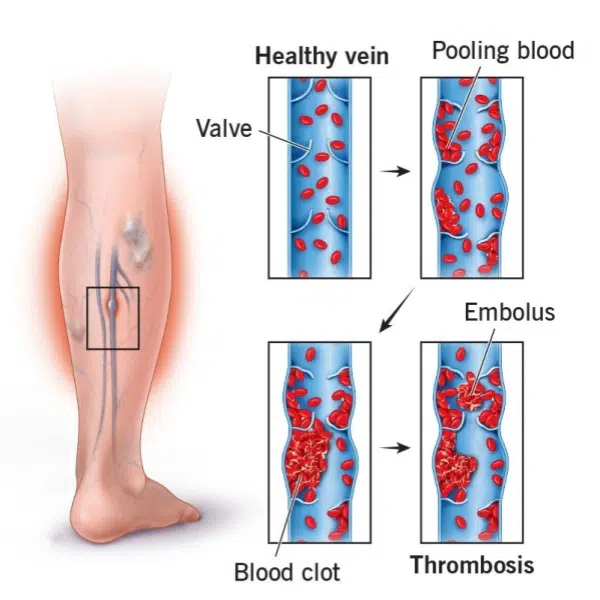
Source:https://my.clevelandclinic.org/health/diseases/16911-deep-vein-thrombosis-dvt
Reduction in Swelling and Edema
Hip replacement surgery often results in swelling and edema within the legs, due to prolonged bed rest and immobility after the surgery.
However, compression socks can also help reduce it again by their pressure-exerting specifications. Their graduated pressure throughout helps to prevent post-surgical swelling and edema, thus relieving pain and ensuring proper healing.
Better Circulation and Improved Venous Return
Compression socks also help to improve blood circulation and venous return to the heart. Post-surgical immobility is known to impair blood circulation, particularly within the legs.
However, there’s nothing to worry about as compression socks exert gradual pressure on the legs, ensuring efficient blood flow back to the heart, and preventing blood pooling.
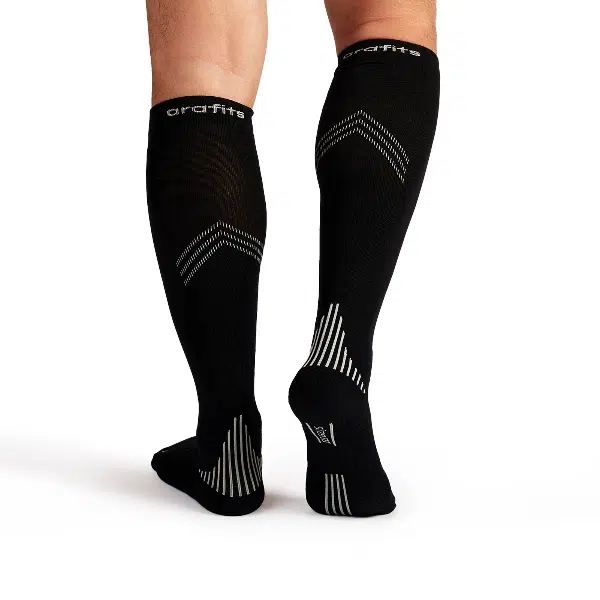
Source:https://www.amazon.com/dp/B0D97CVW1D
How Long Should You Use Compression Socks after Hip Surgery?
The duration for wearing compression socks after hip surgery isn’t steady or unchanging. Instead, it varies from person to person, depending upon the circumstances and requirements of the patients.
However, some general recommendations are as follows:
Immediate Post-Recovery Period (2-6 Weeks)
Wearing During the Day
Some doctors recommend wearing compression socks throughout the day while removing them at night, as too many hours of wearing can also lead to muscular strain.
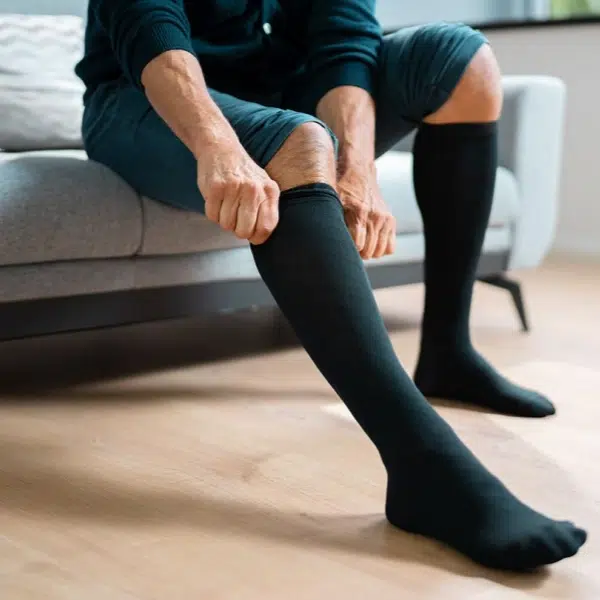
Source:https://blog.columbusmedicalassociation.org/blog-1/2022/1/14/how-compression-stockings-can-change-the-way-you-feel-and-improve-your-health
After Initial Weeks (Post 6 Weeks)
After this period, doctors advise wearing compression socks for about 6-8 hours a day, and not 24/7 as the requirements for wearing compression socks decrease after the initial period.
Other Measures for Post-Hip Surgery Recovery
Recovery after hip replacement surgery requires adequate care and precision. While compression socks play a great role in aiding post-surgical recovery, it is still only one aspect. There are several other ways as well to aid post-surgical recovery. They are as follows:
Medications
Medicines that should be taken after hip replacement surgeries include:
- Anti-inflammatory and pain medication like ibuprofen, naproxen, or celecoxib to prevent swelling and inflammation
- Antibiotics for preventing infections
- Analgesics or NSAIDs for pain relief
- Antiemetics to avoid complications of anesthesia
- Blood thinners or anticoagulants to prevent the formation of blood clots due to prolonged immobility or venous stasis

Source:https://www.denverhealthmedicalplan.org/blog/your-medications-are-most-effective-when-they-are-current
Nutrition and Hydration
Proper nutrition also plays a crucial role in the healing process after hip surgery. A well-balanced diet rich in vitamins, minerals, and protein helps repair tissues, strengthens bones, and supports the immune system. Key nutrients to focus on include:
- Protein: Important for tissue repair and muscle recovery
- Calcium and Vitamin D: Essential for bone health and healing, and helps to strengthen the bone around the hip joint
- Vitamin C: Supports collagen production and aids in wound healing
- Omega-3 Fatty Acids: Known for their anti-inflammatory properties, which can help reduce swelling and promote recovery
Adequate hydration is equally vital, as it helps maintain blood circulation, supports metabolic processes, and prevents complications such as constipation, which can result from pain medications or reduced physical activity.
Exercises after Hip Surgery
Simple exercises for hip recovery after hip replacement surgery include:
- Ankle pumps
- Quad sets
- Glute squeezes
- Heel slides
- Leg raises
- Side leg raises
- Standing marches
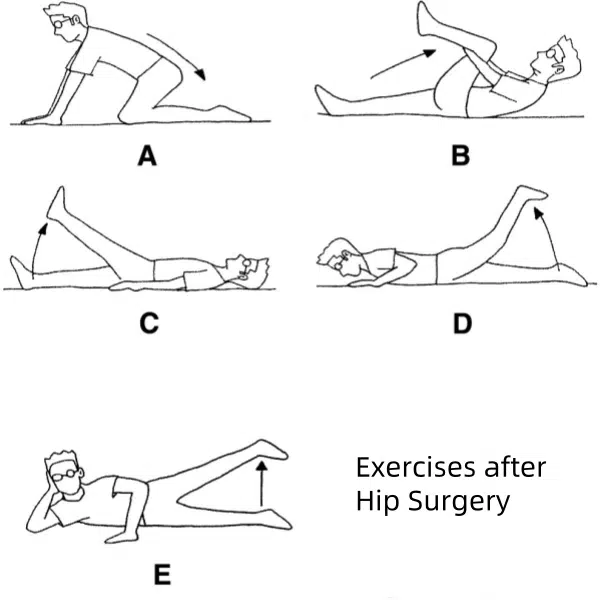
Source:https://www.sciencedirect.com/science/article/abs/pii/S0003999304003065
Physical Therapy
Physical therapy (or physiotherapy) also plays a crucial role in promoting post-surgical recovery. Get yourself a physiotherapist who will help you well in physical therapy procedures.
Lifestyle Modifications
- Follow the plan that your doctor has prescribed
- Do regular physical activity
- Maintain healthy weight
- Use walkers to assist in walking
- Maintain proper posture
- Eat a balanced diet
- Stay well hydrated
- Avoid smoking
- Limit alcohol drinking
- Regular follow up

Source:https://curaadvancedphysiotherapy.in/best-tips-of-lifestyle-modification/
Frequently Asked Questions (FAQs)
1. What is the recovery time for hip dislocation surgery?
Complete recovery time from hip surgery typically lasts around 3-6 months.
2. When am I allowed to stop wearing compression stockings after hip replacement?
You can stop wearing compression stockings after the initial recovery phase i.e. 2-6 weeks after surgery, upon your physical therapist or doctor’s consultation.
3. For how long should you wear compression socks after surgery every day?
It is advised to wear compression socks throughout the day during the initial recovery period, or for 6-8 hours during the day in some cases.
4. How to take off compression socks after hip replacement recovery?
To remove compression socks comfortably after a total hip replacement, sit cozily on a sofa or a chair with your leg elevated. Use a sock aid or sock reacher to pull off your socks without bending too much. Keep your straight leg elevated during the process to avoid straining your hip and ensure a comfortable experience.
5. Can I skip wearing compression stockings for a day?
It’s recommended not to skip wearing compression socks after a hip replacement operation unless your doctor advises you to do so.
6. When am I allowed to bend to put socks on after hip replacement?
You can bend to put your socks on after around 6-8 weeks of your orthopedic surgery.

Source:https://www.gethealthyveins.com/2022/01/03/how-compression-stockings-can-change-the-way-you-feel-and-improve-your-health/
Crux of the Matter
Compression socks are one of the most important measures to support post-surgical recovery after hip replacement surgery. They help to prevent blood clots, DVT, varicose, veins, pooling of blood, and pedal edema by their graduated pressure-generating capability throughout the legs.
However, it is generally recommended to wear compression socks constantly for 2-6 weeks after the hip implant, but the duration might vary in individuals depending upon the needs and circumstances. Thus, proper consultation with your healthcare provider is essential to avail all the benefits of wearing compression socks after hip surgery.
So, if you’re recovering from hip replacement surgery, it is always best to consult your healthcare provider for optimal recovery results.



